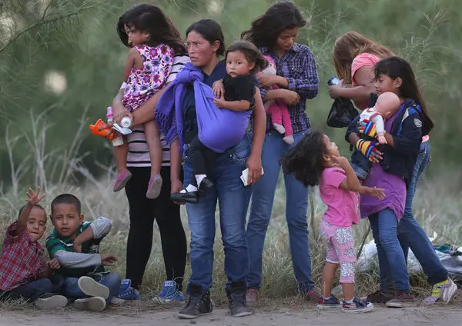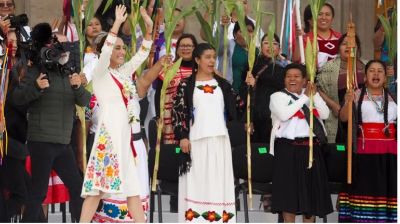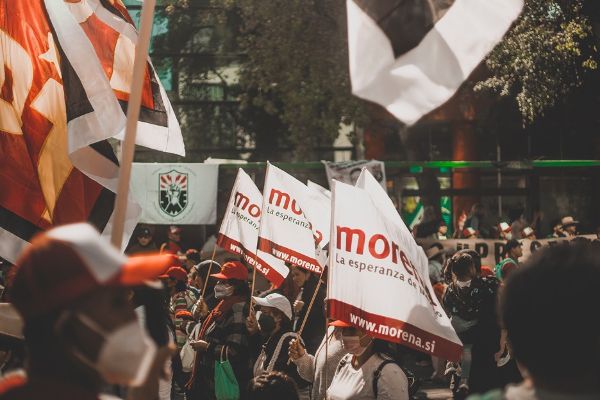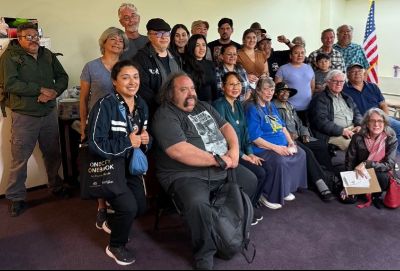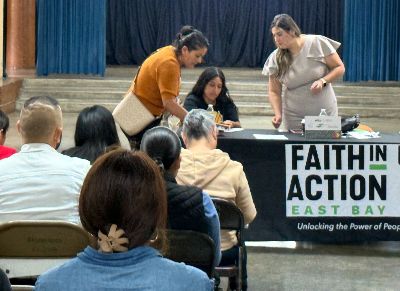|
|
The weekly newsletter of the Mexico Solidarity Project |
|
Every issue archived online at mexicosolidarityproject.org/archives/ |
|
September 10, 2025 |
|
|
|
When Home is Both Mexico and the US |
|
Meizhu Lui, for the editorial team |
|
|
So many Mexicans have spent years living and working in both Mexico and the US. Mexican Congresswoman Roselia Suárez is one of these — her feet are wide apart, one in Michoacan, one in Chicago, and like others, she wants no country to force her to choose one or the other.
Roselia and the five diputadas/os and one senator who live in the US have double consciousness and double duty. They travel to Mexico when the Mexican Congress is in session, but their homes are in San Diego, Chicago, Los Angeles and more. Their passion and commitment is to serve both constituencies.
As a Mexican in the US, you may be documented at some times, undocumented at others. While in the US, Roselia fought for all immigrant workers to have the same rights as other workers. As a Mexican congresswoman, she advocates she advocates for US Mexicans to be integrated into social welfare programs and given a fresh start if they return.
Today, the US and Mexico governments could not differ more starkly in their attitudes towards people with roots in both countries. Since the Morena revolution in 2018, the Mexican government recognizes the vital role played by the millions of their citizens who live in the US. They call them heroes and heroines for their sacrifice and their contributions to both countries’ economies. Trump calls them thugs and rapists.
In this environment, what can be done? A lot! That is the hope of Roselia and her fellow diputadas/os if they do their work with creativity and care. They may have feet in two countries, but their hearts unite the people and places they love. |
|
|
Mexican Women Take Government Reins |
|
Roselia Suárez didn't let domestic violence derail her life. As a Morena activist who now serves in the Mexican House of Representatives, she has two constituencies: Mexicans in west-central Mexico and in the US, where she currently lives. Due to her own life experience, she advocates particularly strongly for women and working people. |
|
|
When did you come to the US? What’s your immigration status?
I didn’t set foot in the US until 2013. My Mexican boyfriend was moving back to Chicago, his city of birth, and I came too, right out of college. I first had a tourist visa, but then I decided to study English in the US, so I got a student visa. In 2019, we got married, I got a work permit, and I was in the process of getting permanent status.
But after a nine-year relationship and a four-year marriage, I realized my husband was manipulative and abusive, and I said, “Enough!” |
|
When my husband kicked me out of the house, I did go to the police. But I didn't know the importance of reporting domestic violence, so I didn't file a report — I was afraid to tell them anything. Instead of leaving the house, I should have called and waited for the police because their report would be evidence. Without evidence, the immigration case gets complicated, and that's why migrant women are so vulnerable in abuse cases. |
|
|
In a legal first, a woman was ruled eligible for asylum on the basis of domestic abuse: Julia Preston, NYT, Aug. 29, 2014 |
|
So, in 2023, we separated. At first, I kept my Social Security number and my work permit, but on returning to the US after a trip to Mexico, Customs took away my residency permit. I’m still stuck in the visa machine waiting for my status to get resolved. I’ve moved back to Mexico but still have my apartment and car in Chicago.
Over 12 years going back and forth to Mexico but living mostly in the US, I’ve been documented and undocumented. I’ve lived with constant uncertainty.
You have a particular interest in issues facing workers, and you’re a strong supporter of unions. Why is that?
In Chicago I worked as a waitress, a bartender, a cashier and a Spanish teacher. I was considered an “essential worker” during the COVID pandemic. Essential! — meaning we had to be at work and had no right to be sick. Then I worked as an electrician’s helper; my classification was subcontractor, not employee, so I had no rights on that job.
In 2023 I got a job as a mental health technician at the Chicago-Read clinic. That was a game changer! For the first time, I was in a union and had health insurance. I learned unions make a big difference for getting fair treatment as well as for benefits.
Were you always interested in electoral politics? |
|
My home state is Michoacan, where I was in the Morena social movement. In 2014, when the activists decided to make it an official political party, I was among the first members in my city. |
|
|
Morena Michoacan facebook page |
|
I got experience working with the party’s Secretary of Youth and campaigning for an alderman running on the Morena ticket.
At the end of the 2015 elections, I went back to Chicago. I wanted to find Morena in the US and did find it with progressive leaders like Alfonso Seyva and Jorge Mujica in the organization Arise Chicago, which organizes working-class immigrants to fight injustice.
After AMLO became president, Mexicans in the US were saying, “What can we do? We want a 4T in the US too!” The 4T was Mexico President Lopez Obrador’s 4th Transformation project. |
|
|
October, 2024: Sheinbaum declares the ‘beginning of the second floor’ of the 4T of AMLO: Forbes: Photo: Angélica Escobar |
|
Claudia Sheinbaum inspired me hugely when she was elected president in 2024. At her inauguration, she said, “It’s time for women! I say we're arriving because I'm not arriving on my own; all women are arriving.” That was electric! |
|
So, I’ve been an activist, and I’ve experienced the problems ordinary people in my community also face — this makes me a good representative.
But what can the Mexican congress do to help Mexican citizens in the US?
Here’s a recent example: President Trump’s “Big Beautiful Bill” says the US will start charging a 1% tax on remittances. This is unfair because we’ve already paid income tax on this money. We can’t change US laws, but Mexico created a new use for a government-issued bank card called Finabien, which can handle both dollars and pesos. Beginning January 1, Mexicans in the US can use it to send money directly to Mexico — and avoid the new tax! They can also skip Western Union’s high fees. We’re designing tools that other countries can copy too.
Furthermore, when a Mexican citizen dies in the United States, the Mexican government — depending on the citizen’s economic status, of course — will pay up to $1,300 to transfer the body to Mexico for burial. We take care of people even after they die!
To keep transforming Mexico, Morena must keep winning elections. Is there a concern?
In June 2025, at Morena’s Congress, we decided on a campaign to restructure the party in every corner of Mexico by forming local Committees in Defense of the 4th Transformation. On Sunday, August 17, we kick off the campaign. We’ll have political education meetings every Sunday with the goal of building a Party membership that understands and carries out Morena’s principles. By consolidating our party at the most local levels and building upward, we’re preparing for the 2027 midterm elections. |
|
A fundamental Morena principle is for all of us to act ethically — no corruption, no selfishness. That’s how AMLO won in 2018. For me, I feel that even if other people don’t know I’m doing something wrong, if I know it, I need to change my behavior. To win elections, Morena must win people’s trust. |
|
|
|
|
If you want to run for Congress on the Morena ticket, Morena requires a record of community service, shown by participating in a community organization.
With a foot in each country, you want the US and Mexico to have a respectful partnership that benefits both countries. How can that happen with Trump?
Mexico can set a good example! Our labor laws protect all workers, whether citizens or migrants. We encourage Mexicans who started small businesses benefitting the US economy to come back to Mexico and do the same thing here. To protect people before they migrate, we have a campaign on “Knowing your migrant rights and your labor rights: in Mexico, the United States, and Canada.”
I’ve proposed a new Mexican law that would provide identification cards for migrants from all parts of the world, including those undocumented or in transit. Migrants are indispensable to our economy too! President Andrés Manuel López Obrador and President Sheinbaum called it Mexican humanism, meaning respect for all people.
We can show the US and the world that we are a caring people — and that care and inclusion improve our economy and standing in the world. Everyone wants to live in a safe place where they have rights, where the government cares about them. That’s what we aim to provide.
Are you glad to be a Congressional representative?
There’s no difference between being a community activist and a political activist. But you can help the people more as their official representative in government. If you’re a good organizer and people see you as a leader — go for it! Run! |
|
|
|
Roselia Suárez spoke at the ACPWU union membership meeting and to a church group as part of a cross-country tour of of the US to meet and listen to the concerns of Mexican living in the US |
|
|
|
|
Mexico Proves Neoliberalism's Failure
|
|
Excerpt from Claudia Sheinbaum’s first state of the nation report delivered on Sept. 1, 2025.
The dark neoliberal night has been left behind. It was a model that held that the State should not intervene in development nor concern itself with redistributing wealth, but merely create a favorable business environment, trusting that investor profits would eventually benefit all of society.
The experience of those decades proved this idea to be completely wrong. Without an active State role aimed at ensuring social justice, the concentration of wealth only deepens inequality and leaves millions in poverty. Furthermore, in our country, corruption harmed the well-being of the people for far too many years.
The most important lesson of that economic model is that progress without justice is not sustainable—socially, economically, or politically—and is doomed to fail. Its fundamental mistake was ignoring that the accumulation of wealth without ensuring its fair distribution generates inequality and serious social conflicts.
Fortunately, we are consolidating a new economic model that guarantees macroeconomic stability but promotes Shared Prosperity with fair wages and social wellbeing programs, strengthens education, healthcare, and access to housing, promotes regional development with foreign and national public and private investment, while governing with honesty and Republican Austerity.
Mexican Humanism also consolidates sovereignty, democracy, and freedoms.
In Mexico, there is no repression, no use of State violence against the people; the greatest freedom of expression in history is exercised; censorship does not exist; all authorities are elected by the people; and the President walks without fear and close to the people throughout the country. That is why, let it be heard loudly and clearly: the Fourth Transformation not only continues—it deepens, it takes root in the people with more strength than ever. In other words, the Transformation advances.
Note: Given the threats of invasion by Trump, she responded forcefully in her speech. She reiterated this statement the next day in her talks with US Foreign Secretary Marco Rubio.
“The people of Mexico, under no circumstance, will accept interventions, intrusions, or any other act from abroad that harms the integrity, independence, and sovereignty of the Nation, such as coups, interference in elections, or violation of Mexican territory — by land, water, sea, or airspace. |
|
|
|
Recent news reports and commentaries, from progressive and mainstream media, |
|
Pablo Meriguet, In Rubio-Sheinbaum meeting, US agrees to restrict security enforcement to respective borders People’s Dispatch. Although no major security agreement was reached, Mexico and Washington highlighted their good relationship. The meeting comes after a US attack on a small boat in the Caribbean Sea.
¿Y la jornada laboral de 40 horas? Ricardo Monreal aclara que la iniciativa no está en la agenda legislativa El Financiero. La reforma para reducir la jornada laboral a 40 horas no figura aún en la agenda legislativa, informó este jueves el coordinador de los diputados de Morena, Ricardo Monreal.
President Sheinbaum Hails Mexico’s Economic Development Model Telesur English. She highlighted falling poverty, historic wage hikes, and output growth.
"Explícate o renuncia": Taibo II pide a Morena investigar a Adán por "La Barredora" Sin Embargo. Paco Ignacio Taibo II recordó que no "no tiene particulares simpatías" con Adán Augusto López, pero aseguró que no lo juzgará sin tener pruebas de su relación con el cártel "La Barredora".
Megan Janetsky, From Trump to social programs: Mexico’s first female president takes stock after a year in office Associated Press. “Under no circumstance will we accept interventions, interference, or any other act from abroad that is detrimental to the integrity, independence, and sovereignty of the country,” she said.
Alfredo Valadez Rodríguez, “Cada año crecerá el salario mínimo 12%”, promete Sheinbaum La Jornada. “Cuando el trabajador gana más, se distribuye la riqueza, por eso me comprometí a que cada año va a seguir aumentando el salario mínimo, al menos en 12 por ciento anual, para que pueda comprar 2.5 canastas básicas”, recalcó.
How the Drug Trade Relies on the US Military WORT. Oswaldo Zavala says that we need to reassess the US’s entire national security agenda. That includes rejecting the language of “cartels” and the “War on Drugs.”
Micaela Varela, El horizonte de la jornada de 40 horas que araña México en la nueva legislatura El País. El proyecto para aliviar el tiempo que se le dedica al trabajo acumula iniciativas en el Congreso y presionan a los legisladores a acelerar su aprobación.
Tiago Nogara, The Restoration of the Monroe Doctrine and Trump’s Imperialist Offensive in Latin America MR Online. It is no surprise that Mexico’s Fourth Transformation governments have consistently emphasized the urgent need to democratize their country’s oligarchic judiciary—a system that mirrors that of many others in the region.
Gabriel Vera Lopes, El pueblo manda y el Gobierno obedece: el desafío de la construcción del poder territorial en la Cuarta Transformación Rebelión. En todo México, militantes de Morena organizan poder territorial para que la ciudadanía participe y controle decisiones. |
|
|
|
|
The Mexico Solidarity Project brings together activists from various socialist and left organizations and individuals committed to worker and global justice. We see the 2018 election of Andrés Manuel López Obrador as president of Mexico as a watershed moment. AMLO and his progressive Morena party aim to end generations of corruption, impoverishment, and subservience to US interests. Our Project supports not just Morena, but all Mexicans struggling for basic rights, and opposes US efforts to undermine organizing and Mexico’s national sovereignty.
Editorial committee: Meizhu Lui, Bruce Hobson, Agatha Hinman, Victoria Hamlin, Courtney Childs, Pedro Gellert. To give feedback or get involved yourself, please email us! |
|
Subscribe! Get the Mexico Solidarity Bulletin in your email box every week. |
|
Web page and application support for the Mexico Solidarity Project from NOVA Web Development, a democratically run, worker-owned and operated cooperative focused on developing free software tools for progressive organizations. |




